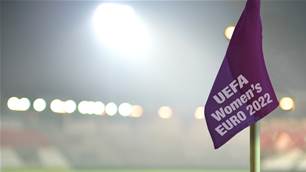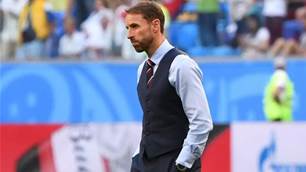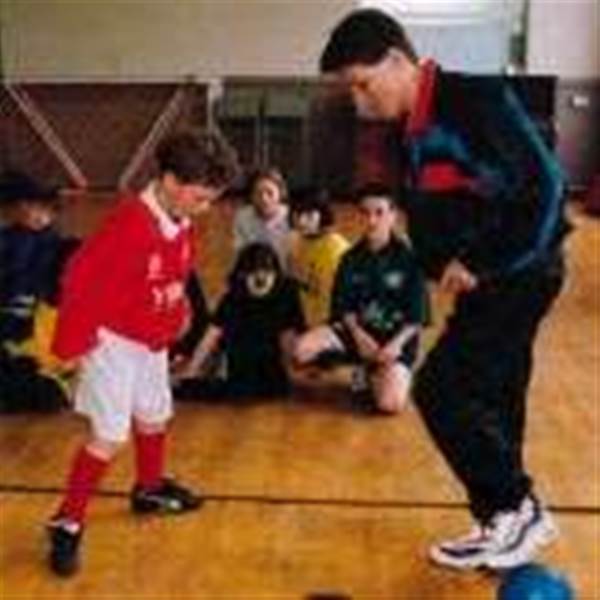In the third part of our investigation of youth development, FourFourTwo discovers a crisis within the English game and meets the man who claims to be its saviour.
Page 1 of 4 | Single page
Observing one of Simon Clifford’s training sessions can be like watching a Japanese game show. It’s the middle of January and a dozen or so 18-year-olds are running along the side of Leeds’ Roundhay Park Lake up to their waists in freezing cold water. The surface underfoot is uneven; every now and then the boys fall face-down into the water. At the end of the run, there’s no let-up. Clifford, a former school teacher, is barking at them to do press-ups with their feet on the bank and their arms in the water. They do so willingly and seem determined to complete the repetitions. You’d struggle to find a fitter set of teenagers in the country.
The team they play for is Garforth Town, a club owned by Clifford which, after two promotions in three seasons, will be playing in the Unibond Northern League next season, one below the Conference North.
Eight rungs higher on the English football ladder, and the Premiership is in rude health. Acknowledged by many as the best league in the world and flush from a new £1.7 billion ($4bn) TV deal, the world’s best players continue to sign for England’s top clubs. The national team has a brand new Wembley Stadium where it can strut its stuff – but look beneath the surface and speak to many involved in the game, and they’ll tell you that English football is on the verge of a major crisis.
“In 10 years time I can see the national team struggling,” says Trevor Brooking, the FA’s director of football development. “We’ve lost a lot of ground in the past five years because the lack of a co-ordinated approach. We all need to pull in the same direction, but at the moment that’s not happening.”
Trevor Brooking is a big fan of Simon Clifford and his efforts to introduce some much-needed technique training to youngsters in this country with his revolutionary Brazilian Soccer Schools. But will it be enough to save English football?
Clifford would like to think so and to show us how he’s going to do it, he invites FourFourTwo to one of his Futbol de Salao classes. Unlike the boot-camp training in Roundhay Lake, the schools offer more intricate ball training using a Futebol de Salao ball, which tries to re-create the skills of Brazilian footballers. That evening, Clifford is taking a class with 20 eight-year-olds and what he shows us is fascinating stuff. There’s very little team play, but plenty of drills with a variety of names. The children attempt “The Ronaldinho”, “The Emerson” and “The Rivelino” – a series of tricks and flicks with a smaller, heavier ball. “Don’t join the orchestra until you’ve mastered your instrument,” is Clifford’s mantra. “The idea of the smaller ball is that because it’s heavy you can’t just lump it to get out of trouble. You have to play a short, clever pass, or dribble it. I’m not saying it’s the best way to train kids, but England doesn’t seem to be producing players who can dribble or pass. Technique complemented by extreme fitness is what I believe in.”
It was good enough for Pelé, Zico and Ronaldo, who began their careers playing Futebol de Salao, and Clifford has proved it can be used to successfully coach children in England. There are nearly 80 Brazilian Soccer Schools in the UK (320 worldwide including one Down Under), and 1700 players who have trained at the schools are currently playing in the junior and senior ranks of pro clubs in the UK, with several also playing at international level. Manchester City defender Micah Richards is one such graduate.
It’s with the money’s he’s earned from his Brazilian Soccer Schools that Clifford was able to buy Garforth Town in 2003. His plan is to fill the team with players trained the Brazilian way – and reach the top of English football.
That bold ambition aside, speak to Clifford about youth development and he despairs of much of what is going on in the English game today. The 1997 Charter for Quality, written by the then FA technical director Howard Wilkinson, who introduced the academy system, is as good a starting point as any. “Wilkinson said that kids should only train in the academies,” says Clifford with a hint of frustration. “The thought was that PE teachers at schools weren’t qualified to offer quality coaching. But in some cases this meant the amount of training dropped from 10 hours a week to three. It was a major step backwards”.
The biggest bee in Clifford’s bonnet is the quality and quantity of practice and coaching youngsters receive in England. After befriending Middlesbrough midfielder Juninho in 1995 he started to understand why Brazil produces more footballers than any other nation and, as he soon discovered, it was nothing to do with simply playing on the Copacabana.
“Brazil produces more players because the kids are practising three, four hours every day. Juninho used to despair of the training techniques at Boro,” says Clifford. “So much so that we use to go to a gym in the afternoon for more. But we couldn’t tell anyone, otherwise Bryan Robson (Boro’s then manager) would have gone mad.”
Clifford has spent much of the past 10 years driving the Establishment mad. Never more so than during his short spell as head of sports science at Southampton. Clifford was brought in to work individually with the club’s promising youngsters like Theo Walcott and Gareth Bale, but despite some encouraging feedback from the players, he found himself at odds with the first team manager Harry Redknapp and his assistant Dave Bassett. “They thought I was working the players too hard,” explains Clifford. “Then Martin Cranie, who had just broken into the first team, pulled a hamstring in training and I got the blame because I’d also been coaching him.” Clifford’s abrasive attitude meant confrontation was never too far away and after two months and 11 days, he left the South Coast under a cloud.
The team they play for is Garforth Town, a club owned by Clifford which, after two promotions in three seasons, will be playing in the Unibond Northern League next season, one below the Conference North.
Eight rungs higher on the English football ladder, and the Premiership is in rude health. Acknowledged by many as the best league in the world and flush from a new £1.7 billion ($4bn) TV deal, the world’s best players continue to sign for England’s top clubs. The national team has a brand new Wembley Stadium where it can strut its stuff – but look beneath the surface and speak to many involved in the game, and they’ll tell you that English football is on the verge of a major crisis.
“In 10 years time I can see the national team struggling,” says Trevor Brooking, the FA’s director of football development. “We’ve lost a lot of ground in the past five years because the lack of a co-ordinated approach. We all need to pull in the same direction, but at the moment that’s not happening.”
Trevor Brooking is a big fan of Simon Clifford and his efforts to introduce some much-needed technique training to youngsters in this country with his revolutionary Brazilian Soccer Schools. But will it be enough to save English football?
Clifford would like to think so and to show us how he’s going to do it, he invites FourFourTwo to one of his Futbol de Salao classes. Unlike the boot-camp training in Roundhay Lake, the schools offer more intricate ball training using a Futebol de Salao ball, which tries to re-create the skills of Brazilian footballers. That evening, Clifford is taking a class with 20 eight-year-olds and what he shows us is fascinating stuff. There’s very little team play, but plenty of drills with a variety of names. The children attempt “The Ronaldinho”, “The Emerson” and “The Rivelino” – a series of tricks and flicks with a smaller, heavier ball. “Don’t join the orchestra until you’ve mastered your instrument,” is Clifford’s mantra. “The idea of the smaller ball is that because it’s heavy you can’t just lump it to get out of trouble. You have to play a short, clever pass, or dribble it. I’m not saying it’s the best way to train kids, but England doesn’t seem to be producing players who can dribble or pass. Technique complemented by extreme fitness is what I believe in.”
It was good enough for Pelé, Zico and Ronaldo, who began their careers playing Futebol de Salao, and Clifford has proved it can be used to successfully coach children in England. There are nearly 80 Brazilian Soccer Schools in the UK (320 worldwide including one Down Under), and 1700 players who have trained at the schools are currently playing in the junior and senior ranks of pro clubs in the UK, with several also playing at international level. Manchester City defender Micah Richards is one such graduate.
It’s with the money’s he’s earned from his Brazilian Soccer Schools that Clifford was able to buy Garforth Town in 2003. His plan is to fill the team with players trained the Brazilian way – and reach the top of English football.
That bold ambition aside, speak to Clifford about youth development and he despairs of much of what is going on in the English game today. The 1997 Charter for Quality, written by the then FA technical director Howard Wilkinson, who introduced the academy system, is as good a starting point as any. “Wilkinson said that kids should only train in the academies,” says Clifford with a hint of frustration. “The thought was that PE teachers at schools weren’t qualified to offer quality coaching. But in some cases this meant the amount of training dropped from 10 hours a week to three. It was a major step backwards”.
The biggest bee in Clifford’s bonnet is the quality and quantity of practice and coaching youngsters receive in England. After befriending Middlesbrough midfielder Juninho in 1995 he started to understand why Brazil produces more footballers than any other nation and, as he soon discovered, it was nothing to do with simply playing on the Copacabana.
“Brazil produces more players because the kids are practising three, four hours every day. Juninho used to despair of the training techniques at Boro,” says Clifford. “So much so that we use to go to a gym in the afternoon for more. But we couldn’t tell anyone, otherwise Bryan Robson (Boro’s then manager) would have gone mad.”
Clifford has spent much of the past 10 years driving the Establishment mad. Never more so than during his short spell as head of sports science at Southampton. Clifford was brought in to work individually with the club’s promising youngsters like Theo Walcott and Gareth Bale, but despite some encouraging feedback from the players, he found himself at odds with the first team manager Harry Redknapp and his assistant Dave Bassett. “They thought I was working the players too hard,” explains Clifford. “Then Martin Cranie, who had just broken into the first team, pulled a hamstring in training and I got the blame because I’d also been coaching him.” Clifford’s abrasive attitude meant confrontation was never too far away and after two months and 11 days, he left the South Coast under a cloud.
Related Articles

World Cup favourites England have one gaping question left to answer

Rampant England reach Women's Euros final













